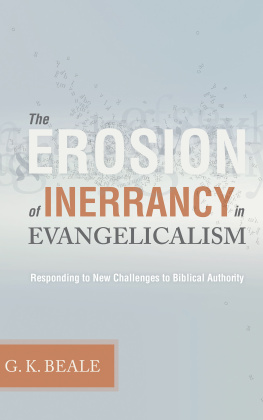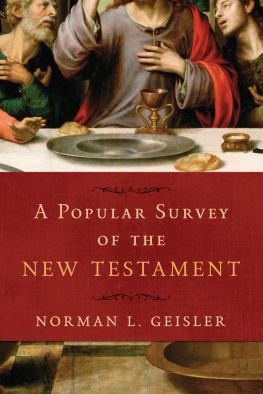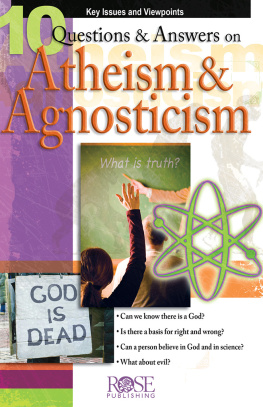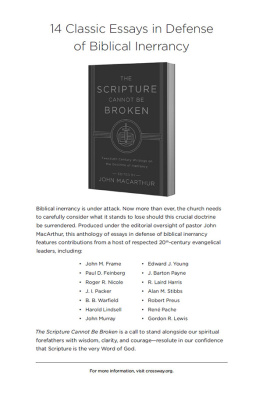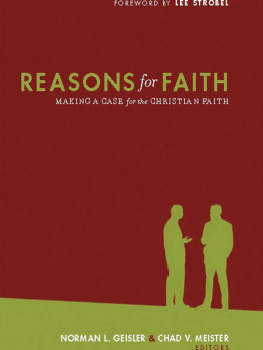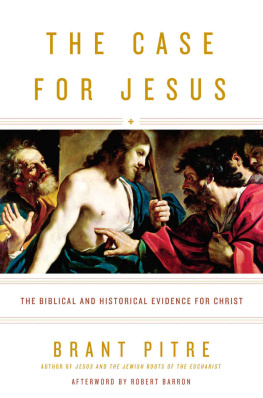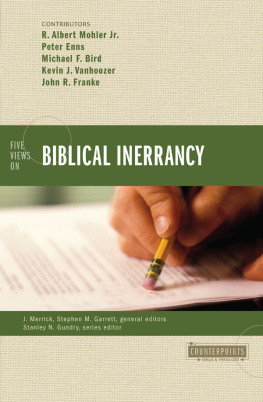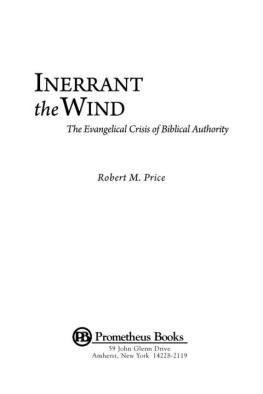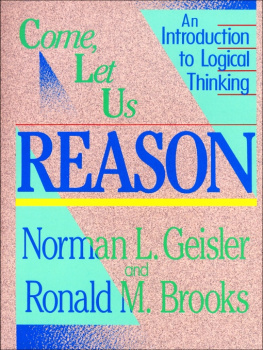Geisler - Biblical Inerrancy: The Historical Evidence
Here you can read online Geisler - Biblical Inerrancy: The Historical Evidence full text of the book (entire story) in english for free. Download pdf and epub, get meaning, cover and reviews about this ebook. year: 2013, publisher: Bastion Books, genre: Religion. Description of the work, (preface) as well as reviews are available. Best literature library LitArk.com created for fans of good reading and offers a wide selection of genres:
Romance novel
Science fiction
Adventure
Detective
Science
History
Home and family
Prose
Art
Politics
Computer
Non-fiction
Religion
Business
Children
Humor
Choose a favorite category and find really read worthwhile books. Enjoy immersion in the world of imagination, feel the emotions of the characters or learn something new for yourself, make an fascinating discovery.

- Book:Biblical Inerrancy: The Historical Evidence
- Author:
- Publisher:Bastion Books
- Genre:
- Year:2013
- Rating:3 / 5
- Favourites:Add to favourites
- Your mark:
- 60
- 1
- 2
- 3
- 4
- 5
Biblical Inerrancy: The Historical Evidence: summary, description and annotation
We offer to read an annotation, description, summary or preface (depends on what the author of the book "Biblical Inerrancy: The Historical Evidence" wrote himself). If you haven't found the necessary information about the book — write in the comments, we will try to find it.
Biblical Inerrancy: The Historical Evidence — read online for free the complete book (whole text) full work
Below is the text of the book, divided by pages. System saving the place of the last page read, allows you to conveniently read the book "Biblical Inerrancy: The Historical Evidence" online for free, without having to search again every time where you left off. Put a bookmark, and you can go to the page where you finished reading at any time.
Font size:
Interval:
Bookmark:

BIBLICAL INERRANCY
The Historical Evidence
By Norman L. Geisler
2013
BIBLICAL INERRANCY: The Historical Evidence
By Norman L. Geisler
Published by
Bastion Books
P.O. Box 1033
Matthews, NC 28106 USA
http://BastionBooks.com
Copyright 1982, 2004, 2013 by Norman L. Geisler. All rights reserved.
No portion of this e-book may legally be copied, reproduced or transmitted in any form and by any means, electronic or mechanical, including photocopying, digital or analog recordings, or by any information storage and retrieval system, without permission in writing from Norman L. Geisler or Bastion Books. However, the following rights are hereby granted only for the legal owner of this e-book: (1) You may store a copy of this e-book file may be stored in safe and unshared location as a backup in case the original is lost to electronics malfunction or theft. (2) You may place a copy of this e-book file on two electronic devices that you own. (3) The purchaser of this e-book may print one paper hard copy and replace that hard copy when it is discarded due to wear, lost, or stolen. (4) Properly attributed quotations of 100 words or less with clear citations is considered .
The first edition of this book was published under the title of Decide for Yourself: How History Views the Bible by Zondervan in 1982 and republished by Wipf and Stock (2004). Print versions of the first edition can be found at Wipf and Stock . Biblical Inerrancy: The Historical Evidence is a revised, second edition of Decide for Yourself .
Cover art: Pictures from left to right depict Jesus reading from the scroll of the prophets, Augustine, Aquinas, Martin Luther, John Calvin, B. B. Warfield, Karl Barth, and C.S. Lewis. The gavel on the Bible suggests verdicts should be made after hearing their different views.
Acknowledgments
T hanks are due to my wonderful wife Barbara who has enriched my life and greatly improved this and all my books. I thank God for her faithfulness for over a half century. I also wish to thank Jim Evans, Christopher Haun and Dr. Kenny Rhodes for their valuable aid in working on this manuscript.
Contents
WHO WROTE THE BIBLE? God or men? If God inspired men to write the Bible, what did He inspire? Their thoughts? Or their words as well? How far does inspiration extend? Does it include only spiritual matters, or does it also include history and science?
The battle for the Bible has the average Christian understandably confused. Actually there is more than one battle, for there are at least six views on the nature and origin of the Bible. In using labels to identify the various views of Scripture, we must be aware that such labels are not absolute in the sense that they precisely define all those who hold to one position or another. They represent the core position of each of the various categories, but there is a divergence of view points within the categories, and some theologians may even hold to different elements of more than one category.
Most evangelicals hold the orthodox view (see Chap. 5); that is, the Bible is divinely inspired in its very words, including matters of history and science. This is also the view of The International Council on Biblical Inerrancy.
Liberal theologians (see Chap. 6), on the other hand, believe that only parts of the Bible are divine. They see great religious value in much of Scripture; but other parts are rejected as myth, and some are even considered barbaric.
Some Fundamentalists (see Chap. 7), strongly reacting against liberals, have affirmed that the Bible was verbally dictated by God word-for-word.
Neo-orthodoxy (see Chap. 8), another reaction to liberalism but without returning to a fully orthodox view of Scripture, holds that the Bible is not a revelation from God. Rather, it is a fallible human record of the revelation God gave in His past actions. That is, God does not reveal Himself in words but only in events.
Liberal-Evangelicals (see Chap. 9) believe that the Bible is wholly human in origin, replete with historical, scientific, and religious errors. They believe God takes these human words and elevates them to be a vehicle of His word.
Much of the contemporary debate is between the orthodox or evangelical Christians and the Neo-evangelicals (see Chap. 10). The latter believe that the Bible is infallible but not inerrant; that is, the Bible speaks with divine authority and complete truthfulness on salvation matters but is not inerrant (without error) in historical and scientific matters.
This book was written for those who do not have ready access to the writings of the main teachers in the church for the past nearly two centuries. As will be seen, their citations support the Orthodox view of the church down through the centuries up to modern times. The other views deviate from the orthodox view because of their acceptance to one or more modern philosophical influences.
From practical considerations, it was necessary to be selective. Within the limits of a small book, I have tried to be fair and representative in the quotations presented. By a minimal use of deletions (...) and by descriptive headings, I have attempted to give the proper context for each authors quotations. For those who wish to read more extensively on the topic, sources are given for all quotations. The purpose of the introductory chapter on the Bible is to present in one location many of the biblical texts on the origin and nature of Scripture. These are the standards by which the claims of the various views are to be measured. Of course, not all verses on the topic could be included; and, admittedly, some speak only to parts of the Bible. Therefore, the reader will have to consider the verses in their context and then decide for himself how they apply to the discussion at hand.
I wish to express my appreciation to the publishers for granting permission to make extensive quotations from the following works:
The Holy Bible, the New International Version. (New York International Bible Society: 1978).
G. C. Berkouwer. Holy Scripture: Studies in Dogmatics . (Eerdmans: 1975).
Archibald A Hodge and Benjamin B. Warfield. Inspiration . (Baker Book House: 1979).
C S. Lewis, Reflections on the Psalms . (Harcourt, Brace: 1958).
John R. Rice. Our God-Breathed Bookthe Bible . (Sword of the Lord: 1969).
Philip Schaff, ed. Nicene and Post-Nicene Fathers. History of the Christian Church, vol 3 . (Eerdmans: 1884).
MANY VERSES here refer to what the prophets expressed orally and which was later put into written form. Also, some verses refer to specific parts of the existing Bible and only by extension to the whole Bible.
I. The Origin of Scripture
A. The Words are from God
All Scripture is breathed out by God and is profitable for teaching... (2 Tim 3:16)
And Aaron told them everything the LORD had said to Moses (Exod. 4:30).
Do not add to what I command you and do not sub tract from it, but keep the commands of the LORD your God that I give you (Deut. 4:2).
As for me, this is my covenant with them, says the LORD. My Spirit who is on you, and my words that I have put in your mouth will not depart from your mouth, or from the mouths of your children, or from the mouths of their descendants from this time on and forever, says the LORD (Isa. 59:21).
This is what the LORD says: Stand in the courtyard of the LORDS house and speak to all the people of the towns of Judah who come to worship in the house of the LORD. Tell them everything I command you; do not omit a word (Jer. 26:2).
Next pageFont size:
Interval:
Bookmark:
Similar books «Biblical Inerrancy: The Historical Evidence»
Look at similar books to Biblical Inerrancy: The Historical Evidence. We have selected literature similar in name and meaning in the hope of providing readers with more options to find new, interesting, not yet read works.
Discussion, reviews of the book Biblical Inerrancy: The Historical Evidence and just readers' own opinions. Leave your comments, write what you think about the work, its meaning or the main characters. Specify what exactly you liked and what you didn't like, and why you think so.


